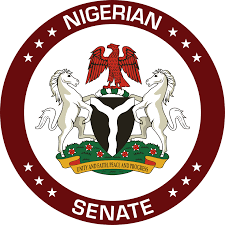Olusegun Ayo Omosehin, Commissioner for Insurance/CEO, NAICOM, (middle) at the event held at the weekend.
BY NKECHI NAECHE-ESEZOBOR—The National Insurance Commission (NAICOM), said NIRSAL’s agricultural insurance schemes is targeting about 3.6 million farmers by 2026, as over 1.47 million smallholder farmers have been covered under the scheme.
Olusegun Ayo Omosehin, Commissioner for Insurance/CEO, NAICOM, disclosed this at a Stakeholders Retreat for the House Committee on Insurance and Actuarial Matters, with the theme “Navigating the New Era of Insurance Regulation: Understanding NIIRA 2025”, held at the weekend in Maiduguri, Borno State.
According to him as at second quarter 2025 a total of 250,000 farmers were insured under federal initiatives.
Highlighting the impact of insurance, he said “Statistics has it that in North Central Nigeria, insured rice farmers recorded 11% higher productivity than their uninsured peers—averaging 20 bags/hectare compared to 18 bags/hectare.
He listed Successful programs such as:
• Kaduna ginger farmers received payouts under the NAGS-AP scheme after suffering over 90% crop loss.
• Livestock and encroachment insurance in Sokoto, Bauchi, Adamawa, and Plateau States are reducing farmer-herder conflicts.
According to him NIIRA 2025, NAICOM aims to:
• Expand index-based and parametric insurance for crops and livestock
• Promote bundled insurance products with inputs and credits.
• Create a platform of collaboration for operators to Partner with tech firms and agribusinesses to scale digital insurance delivery
• Work with state governments to embed insurance into agricultural extension services
On the theme of the retreat, he said “it, reflects our collective commitment to building a modern, inclusive, and resilient insurance ecosystem. NIIRA 2025 consolidates decades of fragmented legislation into a coherent framework that empowers regulators, protects consumers, and fosters innovation.
“This retreat offers a unique opportunity to: deepen understanding of NIIRA 2025’s provisions and implications, strengthen collaboration between legislators, regulators, and industry player and explore strategic partnerships with state governments in providing appropriate insurance cover for Govt Asset, agriculture, and infrastructure.”
NIIRA 2025: A New Dawn For Insurance Sector
Speaking further on benefits of NIIRA, Omosehin said; “NIIRA 2025 is not just about regulation; it is about reimagining the role of insurance in our economy. The new legislation sets out to:
• Modernise our frameworks in line with international standards.
• Safeguards consumers via stronger disclosure, claim handling, and a Consumer Protection Fund.
• Promote ethical conduct, transparency, and sound market practices through stronger governance and oversight.
• Strengthened compulsory insurance to protect lives and property.
• Broaden financial inclusion with microinsurance and Takaful.
• Strengthened the financial health of insurance companies.
• Push digitalisation for greater access, transparency, and trust.
Highlighting the key areas of the Act he said the Act is a chance to shift insurance from being a niche service to being a pillar of Nigeria’s economic stability.
On Compulsory Insurance Enforcement he said “gaps in compliance with the compulsory classes, such as Motor Third Party, Builders’ Liability, Group Life, Health, represents inadequate protection of citizenry and loss of revenue. NIIRA 2025 significantly strengthens the enforcement framework for Nigeria’s compulsory insurance categories. The Act introduces robust enforcement provisions, including clearer penalties for non-compliance and mechanisms for verification.
“A key addition is the mandatory insurance coverage for government assets and employees, ensuring better protection of public resources and aiming to increase premium volume while setting a compliance framework. Legislative support is nevertheless essential in ensuring compliance by States and Agencies.
On Agriculture and Climate Risk “Nigeria loses billions annually to floods, drought, and other climate shocks. Yet only a few of our farmers have insurance. With your support in budget appropriations and subsidies, we can de-risk agriculture sector, protect livelihoods, and strengthen food security.Disasters and accidents shouldn’t always drain public funds. With insurance, government can redirect resources to pressing priorities, hence insurance reduces fiscal burden.
While Infrastructure and Public Assets: “Every year, billions are spent on roads, housing, schools, and hospitals. Without insurance, one disaster can erase years of investment. With enforcement, government’s emergency expenditures can drop by up to 40%, freeing resources for other priorities like education and health. Insurance is a source of long-term capital. With stronger premiums, insurers can fund infrastructure bonds, housing, and industry.
Financial Soundness of Insurers: “The Act introduces stricter capital and solvency rules which is geared towards strengthening insurers, mobilising funds/investmentsin infrastructure and industrial growth, and increasing insurance penetration in Nigeria.”














